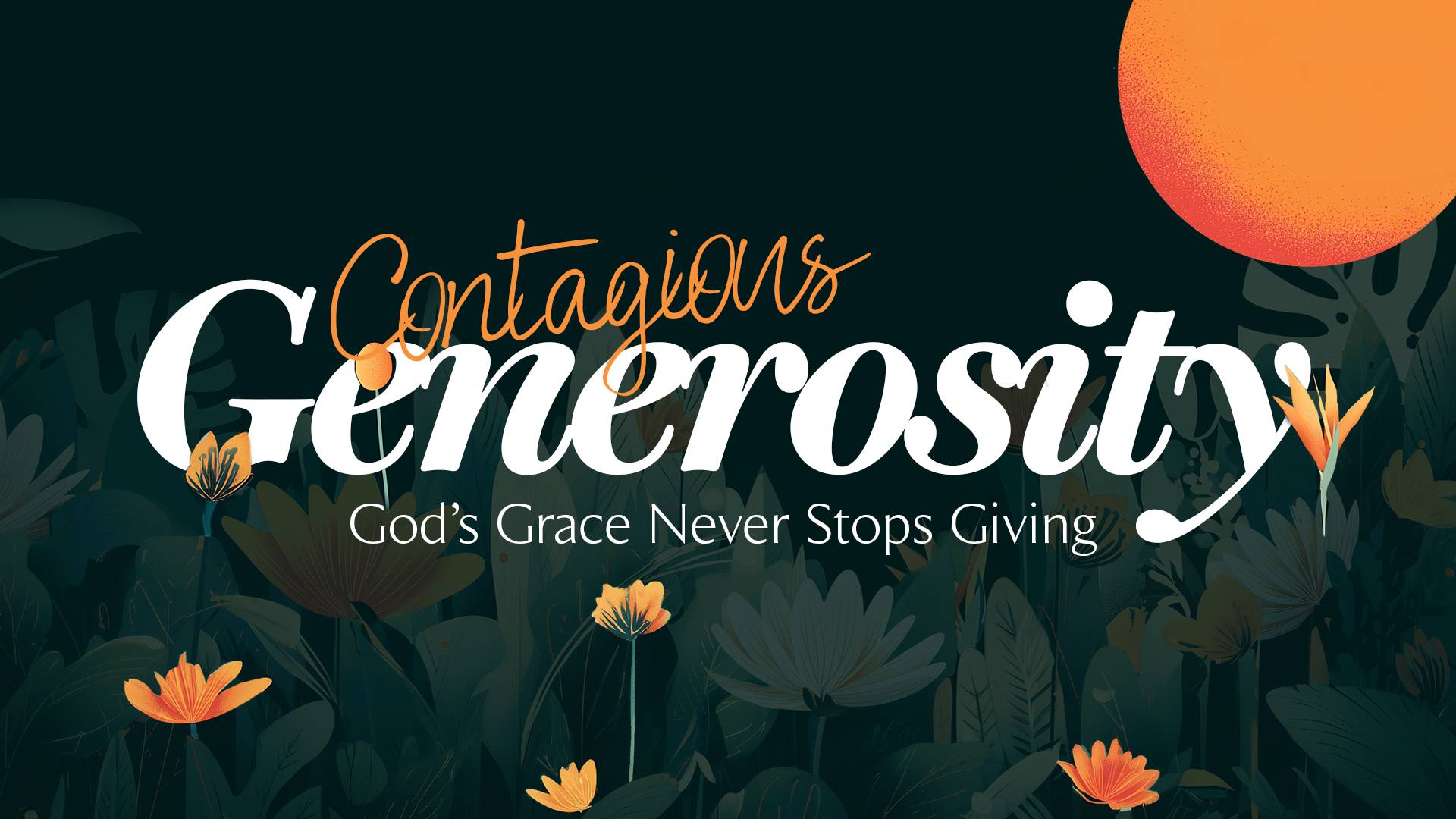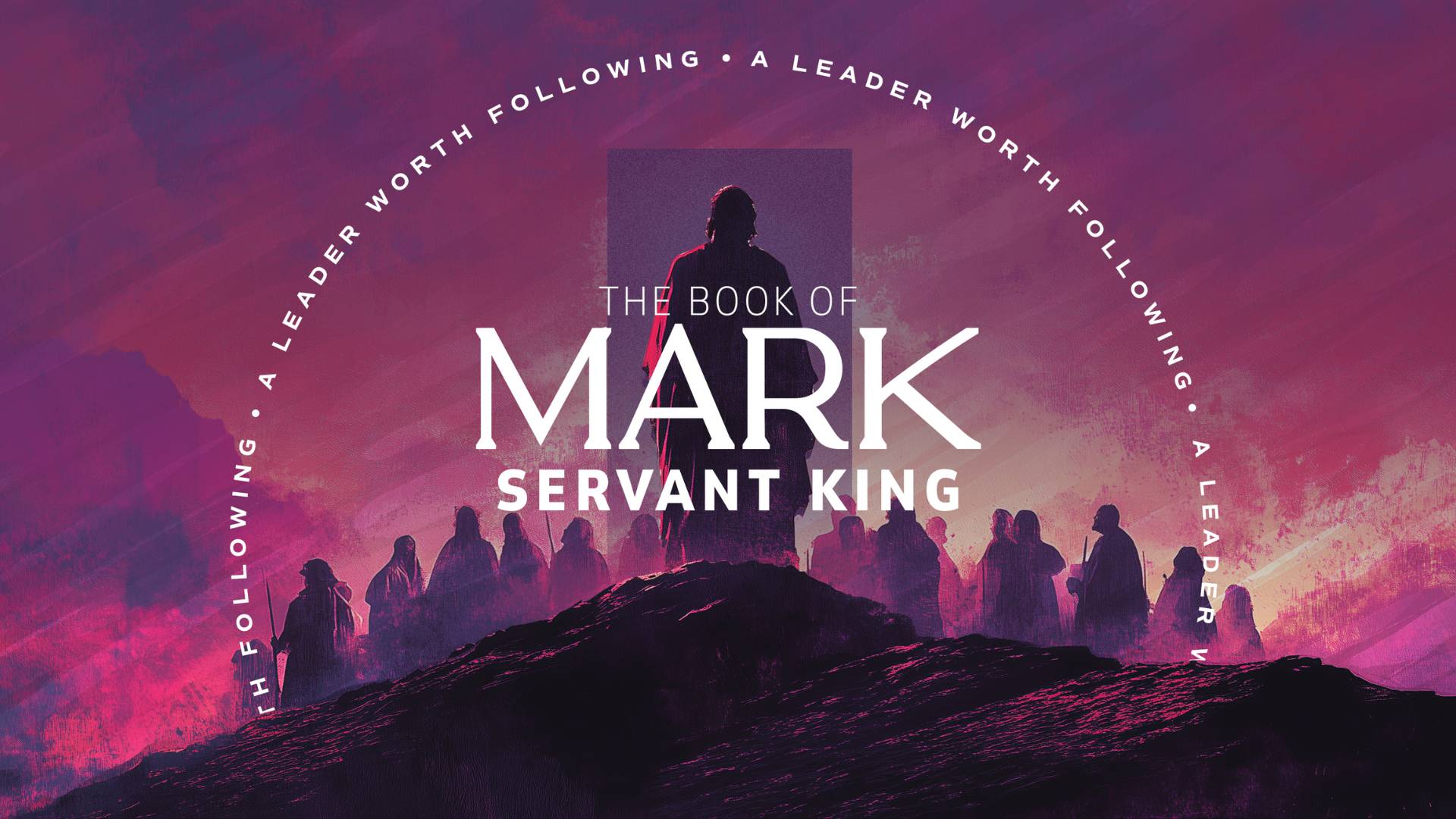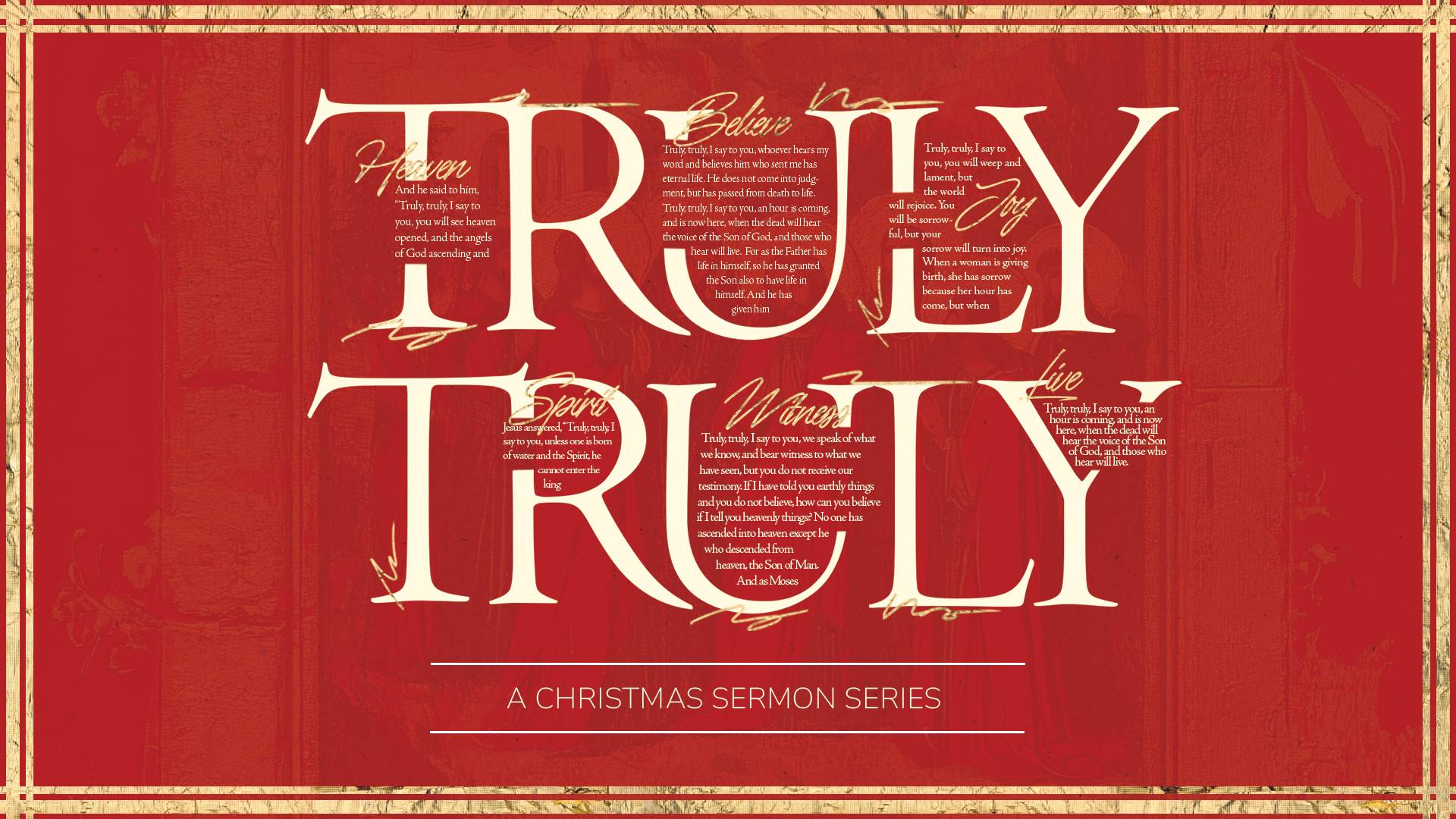In This Series
The Spark of Godly Sorrow
Ezra 9 (ESV)
July 17, 2022
Dr. Ritch Boerckel
We’re going to read from Ezra chapter 9. We only have this week and next week to complete our series in this amazing book. I’m always sad when we come to the end of a book because it’s such a blessing in my heart. I trust that’s true for yours. We’re going to be in Ezra 9. I have to warn you that today is a weighty, weighty part of Ezra. We’ve been thinking about revival and asking God to bring revival to our own hearts, and then to our church. This passage in Ezra 9 deals with the first step toward revival, which is humbling ourselves before the Lord and confessing sin. It’s a weighty subject and an important matter. I trust you’ve been praying through this series that God would work in your life and then also in our church family. We ask God to do an amazing work.
You remember in our study thus far, God allows the people of Israel to move out of exile in Babylon and down to Jerusalem to rebuild the temple. There is temple worship. There is a sixty year lull in Ezra where we don’t know much about the story. Then Ezra appears on the scene at first in Ezra 7. That’s when he first arrives. He moves from Babylon down to Jerusalem. He prays that God would protect them. They’re carrying a lot of gold and silver through a land where there are a lot of bandits. He fasts and he prays with the people. God protects them and brings them to the land. There is this huge celebration at the temple. These are people who have come from exile. So they hadn’t engaged in temple worship and sacrifices. There is great rejoicing when he arrives. Now four months later is where Ezra 9 opens up. So Ezra has had some time to rejoice. He begins to teach the law. Four months later, he discovers something that causes him to sorrow. We’re going to discover what that is in Ezra 9.
1 After these things had been done, the officials approached me and said, “The people of Israel and the priests and the Levites have not separated themselves from the peoples of the lands with their abominations, from the Canaanites, the Hittites, the Perizzites, the Jebusites, the Ammonites, the Moabites, the Egyptians, and the Amorites. 2 For they have taken some of their daughters to be wives for themselves and for their sons, so that the holy race has mixed itself with the peoples of the lands. And in this faithlessness the hand of the officials and chief men has been foremost.” 3 As soon as I heard this, I tore my garment and my cloak and pulled hair from my head and beard and sat appalled. 4 Then all who trembled at the words of the God of Israel, because of the faithlessness of the returned exiles, gathered around me while I sat appalled until the evening sacrifice. 5 And at the evening sacrifice I rose from my fasting, with my garment and my cloak torn, and fell upon my knees and spread out my hands to the LORD my God, 6 saying:
“O my God, I am ashamed and blush to lift my face to you, my God, for our iniquities have risen higher than our heads, and our guilt has mounted up to the heavens. 7 From the days of our fathers to this day we have been in great guilt. And for our iniquities we, our kings, and our priests have been given into the hand of the kings of the lands, to the sword, to captivity, to plundering, and to utter shame, as it is today. 8 But now for a brief moment favor has been shown by the LORD our God, to leave us a remnant and to give us a secure hold within this holy place, that our God may brighten our eyes and grant us a little reviving in our slavery. 9 For we are slaves. Yet our God has not forsaken us in our slavery, but has extended to us his steadfast love before the kings of Persia, to grant us some reviving to set up the house of our God, to repair its ruins, and to give us protection in Judea and in Jerusalem.
10 “And now, O our God, what shall we say after this? For we have forsaken your commandments, 11 which you commanded by your servants the prophets, saying, ‘The land that you are entering to take possession of it, is a land impure with the impurity of the peoples of the lands, with their abominations that have filled it from end to end with their uncleanness. 12 Therefore do not give your daughters to their sons, neither take their daughters for your sons, and never seek their peace or prosperity, that you may be strong and eat the good of the land and leave it for an inheritance to your children forever.’ 13 And after all that has come upon us for our evil deeds and for our great guilt, seeing that you, our God, have punished us less than our iniquities deserved and have given us such a remnant as this, 14 shall we break your commandments again and intermarry with the peoples who practice these abominations? Would you not be angry with us until you consumed us, so that there should be no remnant, nor any to escape? 15 O LORD, the God of Israel, you are just, for we are left a remnant that has escaped, as it is today. Behold, we are before you in our guilt, for none can stand before you because of this.”
May God encourage us through His Word this morning! It’s a sobering word.
I begin with a really important question. What do you do when a bird flies in your hair? (Laughter!) That question may seem irrelevant to you, as it did to me until this past week. From the time I was a little boy, I have been fascinated with birds. I used to place a number of feeders at my house. For now, there are only hummingbird feeders. My wife, Kimberly, loves many of God’s creatures, but birds are not one of them. About two weeks ago I related to Kimberly that I had learned from our friends that you can train hummingbirds to drink nectar from your hand. So I was really kind of fascinated by that. I told her that I planned to get this little handheld bird feeder so that hummingbirds might come so close as to feed right from my hand. I was quite surprised by Kimberly’s negative reaction. She shared that she doesn’t want birds buzzing close to her. She even expressed a fear that one of them might fly into her hair. I tried to ease her concerns by relating that such an event had never happened in her entire life and that it was very, very unlikely that it would happen in the future.
This past Thursday morning, Kimberly and I were enjoying the morning on our front porch. A new day had dawned and we were just sharing a bit together. Suddenly, Kimberly let out a cry. She began waving at the top of her head. At first I didn’t know what was happening, but sure enough a sparrow had flown right into her hair. (Laughter!) After two or three swats, the little sparrow dislodged itself and flew away. Thankfully, Kimberly was not injured, but understandably, she was a bit distressed. In comforting her, I noted how ironic (Laughter!) that just a couple weeks ago I tried to convince her that a bird was not going to fly into her hair. I tried to convince her that was an unfounded fear. Well, I definitely had to “eat crow” that day. (Laughter!)
What would you do if a bird flew in your hair? You would likely do what Kimberly did. You would act immediately to extract it. A bird in the hair can injure you. A bird in your hair can carry disease. A bird in your hair distracts from everything else important. A bird doesn’t belong in your hair. It would be foolish to just let it live there. We open up our Bible’s to Ezra 9 this morning. Here Ezra discovers that a bird had flown into the hair of God’s worshipping people and the people were just living with it.
In God’s Word, birds are sometimes used as a symbol for evil. For instance, in Jesus’ parable of the soils, birds come and eat the seed that falls on the hard ground. Jesus tells us that these birds represent the devil, the evil one who takes the Word of God from the souls of people. The people living in Jerusalem in Ezra’s day had drifted from the Lord. The Temple of the Lord had been built nearly 60 years earlier and it was in use, but the heart of worship had been corrupted over those 60 years of renewed worship. The people were still going to the rebuilt Temple. The people were still making sacrifices to the Lord. The people were still going through the motions of worship. But they had allowed sin to fly into their hearts and worse, they allowed sin to build a nest there.
This people had an outward conformity in their worship, but they had lost the inward reality of worship. So instead of responding with violence against sin to chase sin out of their lives, they had grown accustomed to it. They had become friends with it. Their consciences had become seared and hardened to the sinfulness of sin. They believed that ongoing open sin was not really a big deal. It wasn’t a big deal to them and they didn’t believe it was a big deal to God. They thought that they could worship God and disobey God at the same time.
I believe that if you asked them, “How is your walk with God? How is your worship of God?” I believe they would say, “It’s great! It’s never been better. We’re having a great time worshiping in the Temple.” I believe they, like all those who have grown accustomed to sin in their hearts, evaluated their walk with God on the basis of emotion instead of obedience. They likely experienced many positive emotions toward God as they sang songs and they prayed and they entered the Temple and as they worshiped with other people. But those emotions didn’t translate into whole life transformation, whole life submission to the Lordship of God. Here’s the truth. Worship activities without whole life submission, offends the Lord. It actually has a negative impact upon us. It would be much better if we didn’t go through the motions at all. It would be better if we just neglected worship all together than to go through some external activities of worship without a heart of submission to God’s authority over us.
It’s in this context that God sends Ezra. God sends a priest and a scribe named Ezra to Jerusalem to revive a people who had lost their passion for the Lord’s glory. They had lost their zeal for the Lord. What are Ezra’s unique qualifications to be a leader who would bring spiritual revival? Well, we looked at it a couple weeks ago in Ezra 7.
Ezra 7:10 For Ezra had set his heart to study the Law of the LORD, and to do it and to teach his statutes and rules in Israel.
Ezra is a man who says, “I need to know what God has revealed about Himself and about His ways.” He sets his life to meditating upon the Word, to memorizing the Word, to delving in, to dig in to understand what God is saying and then to receive it by faith. It’s a faith then that acts upon the Word of the Lord and obeys what God says. Then he sets his life to teach other people the amazing truth, the amazing life-giving Gospel that the Word brings, all throughout Israel.
So God sends this wandering, drifting nation a man of spiritual understanding, a man of faithfulness to awaken them out of their spiritual lethargy. The Lord sends a man who will teach the Bible to a people. He sends a teacher who is teaching a people who likely already know the Bible. As Ezra teaches, I’m sure many of them can say, “I already know that. I read it. I already know that.” But this is a people who had forgotten that the real God speaks through His living Word. They had forgotten that His Word carries authority to which the only right response is to bow before the Lord in yielded spirit. The main idea we’re going to trace through Ezra 9 today is that the first spark of spiritual revival is lit when God’s people listen to the word of the Lord and repent of sin. It’s the first spark. This spark of repentance occurs as the ministry of God’s Word presses itself against our soul.
Remember that in Ezra 7-8 Ezra had lead a group of 5000 Jews out of exile in Babylon. They journeyed for fourteen weeks across 900 miles of really dangerous land. The good hand of the Lord was on them, delivering this group from the hand of marauders and evildoers who would have loved to steal all the gold and silver that they were carrying. Then once in the land, this group took some time to give thanks and to worship the Lord in the temple.
Ezra 8:35 At that time those who had come from captivity, the returned exiles, offered burnt offerings to the God of Israel, twelve bulls for all Israel, ninety-six rams, seventy-seven lambs, and as a sin offering twelve male goats. All this was a burnt offering to the LORD.
They enter the city with joy. Ezra, as the leader, has to have incredible joy as he enters the Temple and participates in Temple worship. But his elation is short lived. Four months after his arrival, he is filled with sorrow by what he discovers among the people, God’s people, the Israelites. These are people who were going to the Temple. They are people who had been participating for nearly sixty years. This morning we consider the spark that leads to revival. As we do so, we do so prayerfully, asking God to light a spark in our hearts, that wherever we are, there would be a spark of His life in our soul. We ask that we would leave here changed, that we would leave here energized, that we would leave here full of zeal for the Lord. The first issue we want to look at this morning is
Our Discovery of Sin
What specific sins were the Israelites committing? We read it right away.
1 After these things had been done, the officials approached me and said, “The people of Israel and the priests and the Levites have not separated themselves from the peoples of the lands with their abominations, from the Canaanites, the Hittites, the Perizzites, the Jebusites, the Ammonites, the Moabites, the Egyptians, and the Amorites. 2 For they have taken some of their daughters to be wives for themselves and for their sons, so that the holy race has mixed itself with the peoples of the lands.
This is not so much a matter of mixed race biologically as a mixed race spiritually. There were people who were set apart by God to worship Him and Him alone. Then there was everyone else in this world who worshiped whatever gods that they created in their own hearts and their own minds. It’s these people who God had set apart for Himself to redeem and to set His love upon and His grace upon, who were mixing with a people who were not devoted to the Lord. Rather, they were devoted to all different kinds of other gods who had all kinds of other different kinds of rules. Many of those rules were very wicked and unclean and abominable to the true God. So this issue is a mixture of spiritual lines, of spiritual hearts. What happens when there is a mixture? It’s not that the clean makes the unclean clean. It’s that the unclean makes the clean unclean. That’s always what happens whenever there is such a mixture.
Ezra knows the specific instructions that God had given His people. In fact, he’s going to outline those instructions right here in Ezra 9. These come from Deuteronomy 7 where there is a very explicit command.
Deuteronomy 7:3-4 You shall not intermarry with them, giving your daughters to their sons or taking their daughters for your sons, for they would turn away your sons from following me, to serve other gods.
That’s what God said from the very beginning in Deuteronomy, before they even entered the land, under Moses’ leadership. He warns us that if that happens,
Deuteronomy 7:4 …Then the anger of the LORD would be kindled against you, and he would destroy you quickly.
Our God is a holy God. He’s a jealous God. Ezra knows what happened in his nation’s history. He knows what happened, for instance, to King Solomon. Solomon intermarried with these peoples who worshiped other gods. 1 Kings 11 is all about that.
1 King 11:4 For when Solomon was old his wives turned away his heart after other gods, and his heart was not wholly true to the LORD his God, as was the heart of David his father.
Ezra knows this. He knows it happened to a really, really good man like Solomon. If it happens to a good man, it’s going to happen to anyone who enters into this kind of association. Ezra also, remember, had just come from Babylon where God had exiled the Jews in Babylon, out of their land, because they had been involved in worshipping other gods. This is the very sin, the worship of other gods, that caused them to be unearthed from their own land and to have the Temple destroyed and to be exiled into Babylon for seventy years. Ezra coming back and thinking that they’re finally through that particular sin, through that problem, comes back and he discovers that problem right on the front doorstep of this people.
If you look back in Ezra 8, we get a bit of theology that we understand about who God is. Ezra knows that God is not a God who is okay with sin. Ezra knows that the good hand of the Lord is vital to all of life. He also knows that God’s good hand is not on everyone. He says that to this pagan king.
Ezra 8:22 “The hand of our God is for good on all who seek him,
The hand of God is for good for all who are humble and contrite, who look to Him in faith and trust.
Ezra 8:22 …and the power of his wrath is against all who forsake him.”
In other words, He is not a benevolent tottering grandfather. He is an infinitely holy God. He is full of sovereign power and righteousness. The power of His wrath is against all those who forsake Him. His wrath is against all those who turn away from Him, all those who go after other gods.
So when Ezra learns what is happening, he responds with godly sorrow. He responds with godly fear. He knows that this sin places the whole community in jeopardy of God’s righteousness, of God’s wrath. He knows that this sin stands in the way of a people really loving God, of really benefiting from all the promises that God had given them, having joy and having purpose and having meaning, having spiritual life in their midst. He knows that everything good rests upon their connection to the Lord and that this particular sin is about to dislodge them from the presence of the Lord in their midst.
So if Ezra knows this and it’s so clear, if Deuteronomy 7 and other places in the Word that God had given this people not to intermarry is so clear, why did the Israelites not think of their mixed marriages as being sin, as being offensive to God? Why is that? It’s fascinating, isn’t it? Sin tends to hide itself in the very people who are committing sin. We likely can see sin in others that we cannot see in ourselves. So why did this people not think of their mixed marriages as being offensive to God when God said so clearly that if you marry these other races that are in the land, who are worshiping other gods, this is an abomination and for this, my wrath will fall upon you. Why couldn’t they understand that? I think there are three reasons.
First, I believe they stopped thinking of God as holy and righteous. They began to think of God as more like them, rather than like Him. He is above, transcendent, pure. In misunderstanding God’s nature, because they weren’t listening to what God had said about Himself and they were listening to what their own hearts said about God, it created an idol that was soft and fluffy. They forgot that the true God hates sin with an infinite hatred and He will not allow sin to abide forever. He will put an end to it. It’s necessary that He does so because all death, everything that is hard, everything that is sad, everything that is destructive, everything over which we mourn comes as a result of sin. Everything! God hates sin, rightly so, with a holy hatred.
The people had forgotten that God is holy and just and they began to think of Him as a God who must be okay with it. The first person intermarried and they stepped back and there wasn’t a lightning bolt from heaven that came down, so God must be good with it, right? The second person, the third person, and pretty soon a whole bunch of people, and it just became common. God must be good with it because God is not acting. They had mistaken and confused God’s longsuffering and His patience with indifference to righteousness.
The second reason that they didn’t think of their mixed marriages as being offensive to God even though God had said so very clearly in His Word, is they stopped listening to God speak to them personally through His Word. I believe that they listened and heard the Word. They understood those passages. But when they came to those passages, they let those passages hit their hearts and then roll off of it, sort of like off of a Teflon plate. They understood it with their mind, but it never sunk down to the level of personal reception. As a result, they weren’t listening to God tell them personally of this act being such a wicked thing. As they lived out in sin, sin became ordinary to them.
Their lives in fact, I believe, were very happy in their sin. They were at least happy in terms of human horizontal happiness. These guys’ wives were likely beautiful and charming. Their wives were probably very sweet to them and serving and enjoyable to live with. It’s very likely that as they compared their marriages to the marriages of faithful Israelites, that they said, “I think I have a better marriage than they do. We get along and it seems like they fight a lot. So, on a horizontal level I don’t see the big deal. In fact, I think this is actually good. If I’m happy, God must be happy.” They stopped allowing God’s Word to bring conviction, to bring its force of truth to their own souls.
Our self-will loves to spin our sin. We convince ourselves that sin is not a big deal. Adam and Eve did this first, but every person’s pride changes the story of our own sin. We rationalize and minimize. We soon believe the story we tell ourselves, rather than the story that God tells us in His Word. Friends, if we listen to ourselves speak to ourselves about our sin, we will be lost. What every one of us needs daily is a fresh encounter with God. He speaks to us so clearly in His Word with gentleness and yet with precision and sometimes with sharpness. It’s the sharpness of a scalpel that would bring healing to us.
The third reason why the Israelites didn’t think their mixed marriages were so offensive to God was they stopped thinking of themselves as a holy people. They began to think of themselves as slightly more moral and perhaps spiritually better than the people around them. They began to fit into the culture. They wanted to be different, but just a little different. Here’s where the cultural wave was riding. They didn’t want to go down deep into the darkness and the behavioral practices of those living in the land because many of those practices were so abhorrent. But as long as they rode the wave just a little higher, they said, “We’re doing all right. We’re not like everyone else,” even though they were. In Leviticus, before the people entered the land, God said
Leviticus 20:26 You shall be holy to me, for I the LORD am holy and have separated you from the peoples, that you should be mine.
I have called you out. I’ve taken you and separated you. You’re not of that group anymore. You’re my precious possession. I’ve separated you so that you would be my people, a worshiping people, a people filled with my life. Ezra understands this because he says in chapter 8,
Ezra 8:28 And I said to them, “You are holy to the LORD,
He is speaking of the priests who represent the people.
Ezra 8:28 …and the vessels are holy,
These gold vessels they were bringing for worship are holy. They are set apart. They’re devoted to God.
What does it mean to be holy? It’s an important question for us to be able to answer for ourselves because if you’re a believer in Jesus, God says you are holy. He says you are holy, for He is holy. So be holy. Live holy lives. So what does it mean to be holy? There are two words that come to my mind when I think of holiness; the word consecrated and the word separated. Consecrated means that we’re completely devoted to the Lord. Our whole life purpose is to worship God and know God, to glorify God, to serve God. We know that God is the God of life and that when we wholly devote ourselves to Him, we’re devoting ourselves to life itself. To be separated means that we distance ourselves from everything that is not devoted to the Lord. So, consecrated means wholly devoted and separated means set apart and removed from all that is not devoted.
I love Romans 12:1-2 because the first verse is about consecration, wholehearted devotion. The second verse is about separation. Let’s remove ourselves and not be part of.
Romans 12:1 I appeal to you therefore, brothers, by the mercies of God,
Don’t you know how much God loves you and how much He paid by offering His Son, Jesus? In view of His mercies, Jesus died for you. He did everything and He set His love upon you so that you would no longer be condemned anymore for your sin.
Romans 12:1 I appeal to you therefore, brothers, by the mercies of God, to present
your bodies as a living sacrifice, holy and acceptable to God, which is your spiritual worship.
This is what worship is about. It’s to be devoted, consecrated unto the Lord. I appeal to you to devote yourselves holy. Do that every day. Then he says about separation,
Romans 12:2 Do not be conformed to this world,
Don’t let the world squeeze you into its mold so that you become like the world in your values and your behaviors and your words and your thoughts. Instead,
Romans 12:2 …but be transformed by the renewal of your mind,
Be transformed so that your life looks completely different from the life of a worldling.
Romans 12:2 …that by testing you may discern what is the will of God, what is good and acceptable and perfect.
So here is the choice before us. It is devotion to the Lord and separation or conformity to the world and connection to sin. The first step toward a spiritual revival is the discovery of our own sin. It’s the discovery and then the turning from our own sin. But we have to choose. We have to choose between the world and worship. We cannot be worldly and be worshipers of the Lord at the same time. Yes, we are in the world, but we’re not of the world. We’re of a different nature. This world isn’t our home. We know that this whole story of God ends with us actually being taken out of the world completely and we’ll be in the kingdom of God and the presence of the Lord forever and ever. We have to decide today. Are we going to be a worshiper who is devoted wholly to the Lord and separated from this world, or will we be along with the world? This people here were a people who by neglect were making a decision away from the Lord. That’s what is stirring up Ezra. Every one of us can be blinded to our own sin. That’s why at the very outset we’re taking so long on this first point. It’s the discovery of our sin. Do I really know my soul? How can I know my soul? Blindness to our own sin is the most common of problems.
A number of years ago, I went to my eye doctor for an annual eye visit. He looked at me and he said, “Ritch, you have cataracts.” I have what? I think I’m seeing okay. He said, “You have cataracts. You need surgery.” Not long after that, I had surgery. After my surgery, guess what I discovered? I discovered how much I wasn’t seeing. I didn’t even realize it. Cataracts are so slow. They were closing in and causing things to become dark when it should have been light. I just got used to the darkness closing in. I didn’t realize that it’s not normal to have to have light pouring onto every page that you read in order to see it. Once my cataracts were healed through surgery, I could see wonderfully and beautifully. So often, we experience a gradual closing and darkening because we take one little sin in and we get comfortable with it. It darkens us eventually to how wicked it is. That leads us to the next step and the next step and then the darkness is closing in. That’s what is happening here among the people.
Let me ask you, might you be gradually going blind? Is that possible? If you say, “No, it couldn’t happen to me,” I’m most fearful for you because all of us should say “Yes, it’s possible to happen to me.” That’s the reason why I need to go before the light of God’s Word every day and have Him shine His light upon my soul. Apart from His work, I would be utterly blind. I want to encourage you to take some time before the Lord even now and then after this sermon, take some time every day to ask the Lord. Seek the Lord to help you discover any sin. In Psalm 139, the psalmist prays
Psalm 139:23-24 Search me, O God, and know my heart! Try me and know my thoughts! And see if there be any grievous way in me, and lead me in the way everlasting!
It’s a wonderful prayer!
Some might be asking, what good comes from knowing my sin? It just seems almost unbearable to know my sin. It seems like it’s only going to lead me to greater depression and sorrow and humiliation. Why would I want to know my sin? Here’s where the Gospel brings such a good word. For every sin we acknowledge before the Lord, there is healing. There is a remedy. There is a medicine that is pure and perfect. That’s the reason why. We don’t have to fear cancer if we know there is a 100% cure of cancer. There is, in Christ. So how do we discover the serious nature of our own sin and what’s really inside of us? The answer is we go before the Lord and say, “Search me, Oh God.” We go before the Lord with an open Bible. God has given us His Word to be used as light to our path, a lamp to our feet. That’s what Psalm 119 says. It’s light. It shines on what is really there.
Psalm 19:7 The law of the LORD is perfect, reviving the soul; the testimony of the LORD is sure, making wise the simple;
It’s so that we can see what we can’t otherwise understand.
Psalm 19:8 …the commandment of the LORD is pure, enlightening the eyes;
Psalm 19:11 Moreover, by them is your servant warned; in keeping them there is great reward.
We’re warned away from behaviors, attitudes, words, values that appear to us and to our own way of thinking to be relatively harmless, by the Word and the light that the Word brings to us. God’s servants are warned off. In thinking about this question, “How can I know the sinfulness of my own heart?” Paul’s answer is the law of God.
Romans 7:7 …Yet if it had not been for the law, I would not have known sin.
The law doesn’t save us. We don’t look to the law in order to know how to overcome sin. We look to the law to help us see our sin. Paul says
Romans 7:7 …For I would not have known what it is to covet if the law had not said, “You shall not covet.”
I love that illustration because I say, “I’m with you, Paul.” I never would have thought that just looking over at somebody’s stuff and saying, “I wish I had that stuff,” that this actually is sin before the Lord, unless the law had said, don’t covet that. Don’t even want it. But I’m not taking it. I’m not taking any action to get it. It doesn’t matter. It’s a matter of your heart. Your heart is wandering from contentment in the Lord. Don’t covet. God’s Word helps us. Let’s pray, “Lord, let me see my sin the way you see my sin. Let me see my sin as the wicked, soul-destroying thing that it is. Open my eyes to the true nature of my sin.” We cannot do this for ourselves. It is the gracious work of the Lord as we seek Him through His Word.
Our Repentance from Sin
Revival begins with repentance. Repentance begins with an awareness of sin. Where there is no repentance, there is no revival. Jesus would say
Matthew 5:3-4 “Blessed are the poor in spirit, for theirs is the kingdom of heaven. “Blessed are those who mourn, for they shall be comforted.
God loves to place His good hand of favor upon those who recognize their spiritual need. The path to God’s favor begins with a heart broken over our own sin. It begins with a heart that is desperate for His cleansing. Ezra knows this.
3 As soon as I heard this, I tore my garment and my cloak and pulled hair from my head and beard and sat appalled.
He sat horrified, astonished, forsaken.
4 Then all who trembled at the words of the God of Israel,
He had been teaching it and there were people who had been listening to him. He says everyone who trembled at the words of the God of Israel,
because of the faithlessness of the returned exiles, gathered around me while I sat appalled
He sat troubled, forlorn, horrified.
until the evening sacrifice.
That’s about 3:00 in the afternoon.
5 And at the evening sacrifice I rose from my fasting,
He is fasting and seeking the Lord. What do we do now that we have discovered sin? What he is doing is praying to the Lord. He is fasting before the Lord.
with my garment and my cloak torn, and fell upon my knees and spread out my hands to the LORD my God,
It’s in this great neediness, when he sees sin for what it is, he becomes desperate and he becomes like a beggar. He takes the posture of a beggar. He is on his knees and he is bringing his hands before the Lord and just calling out in prayer and fasting. It has to have been some time because he included fasting. So this was a duration. We don’t know how long the duration is of this seeking the Lord in contrition, but there he is before the Lord. He is fasting and praying and ministering to the people as he talks about the Word with them and they join in with him in this prayer of confession.
Two times now in Ezra we see him fasting before the Lord. In Ezra 8, they’re about ready to take this long 900 mile journey. They’re carrying a bunch of gold and silver and they’re going through a land where there are a whole bunch of robbers and he’s not going to have any armed guards with him. Do you remember what he did? He spent three days at this place near Ahava and he fasted. He needed God’s protection. He was in big trouble and he said, “It’s time to seek the Lord.” Now, a fast is not a means by which we get God to do what God is reluctant to do. It’s not a work that we say, “If I fast, you’ll do this for me, right?” Fasting is simply an instrument by which we seek the Lord. It’s an instrument where, especially in Ezra’s case, where there is recognition of our desperation before the Lord of great need. We say I need to take some time, more time than even normal, just to seek the Lord and to humble myself and receive His grace. God recognized that prayer and God protected him. The good hand of the Lord was on him.
Ezra 8:23 So we fasted and implored our God for this, and he listened to our entreaty.
God is a prayer answering God. He loves to hear the cries of His people. But then fasting appears here again in chapter 9 underneath a different circumstance. This is not a need for protection, but a need for forgiveness, a need for cleansing. It’s a spiritual need rather than a physical need. Here, Ezra fasts. Fasting is not to earn God’s favor, but fasting is a gift. It’s an instrument that God has given to us to use in order for us to seek the Lord. Here’s what Ezra says.
6 saying: “O my God, I am ashamed and blush to lift my face to you, my God, for our iniquities
Ezra is identifying himself with the people. He is not distancing himself from them. He is one of them. He leans into them as he identifies with their sin and their community need for purification. He says our iniquities
have risen higher than our heads,
What a picture! If God were to stack our sins one upon the other, how high would the pile be? It’s a great question, isn’t it? Ezra says, “As I begin to stack the sins that my people have grown accustomed to, it’s so high that I can’t even reach it. I can’t even look at it. It’s way, way, way, way, way high.” O Lord, if you would count our iniquities, who could stand?
and our guilt has mounted up to the heavens. 7 From the days of our fathers to this day we have been in great guilt.
He starts reviewing the biblical story of God’s grace and interaction with His people.
And for our iniquities we, our kings, and our priests have been given into the hand of the kings of the lands, to the sword, to captivity, to plundering, and to utter shame, as it is today. 8 But now for a brief moment favor has been shown by the LORD our God,
This is our opportunity! This is our opportunity to receive God’s favor. It seems like He is granting favor upon favor.
to leave us a remnant
He’s giving us a people who are truly connected to the life of God and worshiping Him.
and to give us a secure hold within this holy place, that our God may brighten our eyes and grant us a little reviving in our slavery. 9 For we are slaves. Yet our God has not forsaken us in our slavery, but has extended to us his steadfast love before the kings of Persia, to grant us some reviving to set up the house of our God, to repair its ruins, and to give us protection in Judea and in Jerusalem.
In the midst of this, he is reviewing the faithfulness of God, the goodness of God, the favor of the Lord. He is also reviewing the righteousness of God and how God has responded in the past to their sins. He is recalling God’s severe response to sin, but also God’s saving love of them. Both of these are so vital. Then he says
10 “And now, O our God, what shall we say after this? For we have forsaken your commandments, 11 which you commanded by your servants the prophets, saying, ‘The land that you are entering to take possession of it, is a land impure with the impurity of the peoples of the lands, with their abominations that have filled it from end to end with their uncleanness. 12 Therefore do not give your daughters to their sons, neither take their daughters for your sons, and never seek their peace or prosperity, that you may be strong and eat the good of the land and leave it for an inheritance to your children forever.’ 13 And after all that has come upon us for our evil deeds and for our great guilt, seeing that you, our God, have punished us less than our iniquities deserved and have given us such a remnant as this, 14 shall we break your commandments again and intermarry with the peoples who practice these abominations? Would you not be angry with us until you consumed us, so that there should be no remnant, nor any to escape? 15 O LORD, the God of Israel, you are just, for we are left a remnant that has escaped, as it is today. Behold, we are before you in our guilt, for none can stand before you because of this.”
That’s why he is on his knees. None can stand before you because of this. Ezra, through the Word and prayer, discovers God’s view of sin and then he simply agrees with God about it. He says, “I have no argument, here. What we’re doing is an abomination.”
The applications that flow from this act of repentance is first, refuse to lie to yourself about sin. Lying to ourselves about our sin will lead to deeper guilt and sorrow. That’s what this people had gotten used to. They saw the law of God. They knew that they were disobedient, but they just kept lying to themselves. “It’s not a big deal. God understands.” Deception toward our own souls swells our corruption. It swells the consequences of our sin rather than subtracts from it.
The second application is so vital. It’s so important. Let us make humble confession of our sin to God because God offers a sure remedy. There is a place where we can go to find hope. There is a place where we can go to find freedom and forgiveness. That place is the foot of the cross. The last point we want to talk about is
Our Hope in Sin
5 And at the evening sacrifice I rose from my fasting, with my garment and my cloak torn, and fell upon my knees and spread out my hands to the LORD my God,
It’s at the evening sacrifice. That’s important! Ezra seeks the Lord and as he repents, he repents in hope, not in despair. They’re still making sacrifices. What do those sacrifices communicate? Those sacrifices communicate that God has made a way to bring a covering for sin, their sin, even this sin. If they come before Him broken and contrite in spirit, God will heal them even now, despite how obvious and how obstinate they have been. Even now, the evening sacrifice communicates hope. It communicates the provision of God to them.
To us who live in this day on this side of the cross of Jesus, all of those sacrifices we know point forward to Jesus. He is the one to whom every sacrifice points. These point us to Jesus Christ, who on the cross received the punishment that our sins deserve. He suffered, He bled, He died, all in receiving God’s wrath, God’s righteous response against sin upon Himself. He did that so that He could offer us forgiveness, a removal of our sins. Our sins were taken from us and placed upon Himself. Then He could offer the righteousness that He produced all through His perfect, sinless life. He offered His righteousness to be our righteousness so that we would have the clothes of righteousness when we stand before this holy God. That’s the Gospel. The Gospel is not what we have done for God. The Gospel is what God has done for us.
The response to the discovery of our sin is first humble contrition. But then when we rise, the response is not, “I’m going to do better now. I’m not going to sin like I used to. I’m going to make some commitments.” No, the first response is recognizing we can’t reform ourselves. This sin will roll us. We’re helpless in the face of the power, the enslavement that sin brings upon our lives. But there is one who walked through this world for us and was tempted in every way like we are, yet He stood without sin. He’s the one who died in our place. He says, “Now the grace that I have secured through my sinless life, through my perfect death, I’m offering to everyone who comes. Come to me.”
So what is the hope? The hope is that when we discover the sinfulness of our sins, we would immediately place ourselves at the foot of the cross. We say, “God, I need the grace that Jesus Christ has secured for me.”
There’s a place where mercy reigns and never dies
There’s a place where streams of grace flow deep and wide
Where all the love I’ve ever found
Comes like a flood comes flowing down
At the cross, at the cross
That’s the place. Beloved, I want to ask you, have you come to the cross of Jesus? Perhaps you have at one point, but God has awakened you to some sins. Come to the cross right now. You might say, “But I sinned against God willfully.” Come to the cross. Come if you are weary and heavy laden. Come to the cross. You’ll find rest for your soul.
Our world is messed up and it’s getting more and more messed up by the day. Our world takes great pride in sin. Our world loves, for instance, the killing of little babies in the womb. Our world loves that sin. Our world loves the freedom of sexual expression and the freedom to explore illicit pleasures of almost every kind and every variety. It loves those things. Our world loves to make marriage a mockery through redefinition and divorce. Our world loves to set up idols of inclusivity where Jesus is placed as one among many other gods. Our world loves that. Our world loves the exaltation of self. Our world loves the power to control others. What are we to do? What are we as a church to do?
Some believers think that pastors need to preach more about morality and describe the sins of our culture and discuss them. Some believers think that the church ought to be more political and be involved more in government. Some believers think we need more confrontation with our culture and the world around us. These are big questions. They deserve more thought than we have time to give them this morning. But here is one thing I know. Beloved, we first must be a people who are holy to the Lord. Without holiness, no one will see God. Not one of us! Without holiness, we have no light to shine in a dark world. We must be holy, devoted and separated. This is where all life and all hope begins. There is only one way we can become holy, and that is through Jesus. Our Savior who died and rose again promises that the same power from which He rose from the dead is offered to us so that we who are sinners, when we come to Him, God promises to make us holy. Let us ask God to revive us and let us look to Him with expectancy for Him to do that very thing.
Latest Sermon Series
Get the App
Watch the Latest Sermon
Get access to each week's sermon right on your phone. Look up sermons & series.Get the Digital Bulletin
Get the latest updates, events, & family news by checking out the digital bulletin.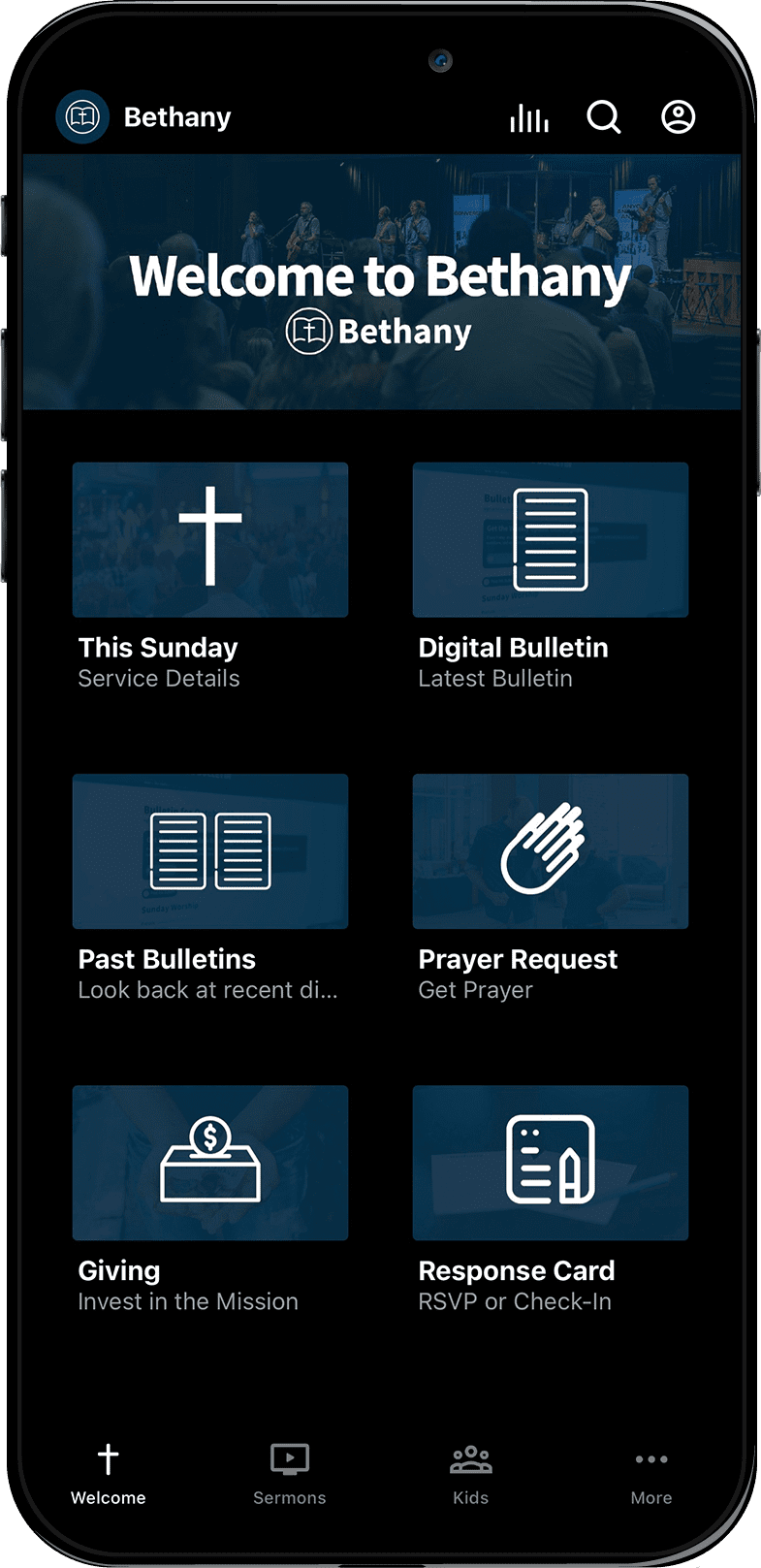
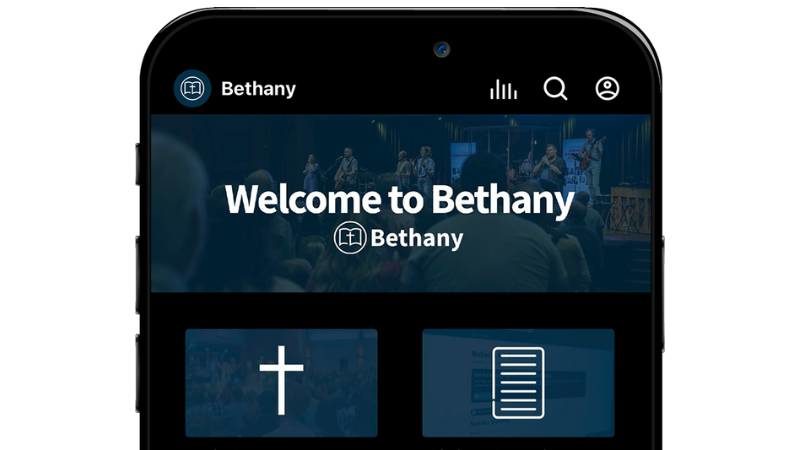
- 1Watch the Latest Sermons
- 2Get the Digital Bulletin
- 3Tell us how to pray for you
- 4Get updates and notifications




